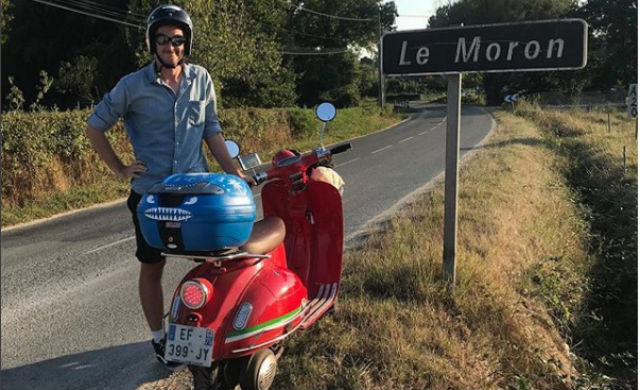
LIVING IN FRANCE
Why you can only get to know the real France if you leave Paris
Life in rural France is slow, the people are warm, it's safe and nothing seems to be open. In other words it's totally different to Paris writes Oliver Gee, who’s halfway through a mammoth honeymoon trip around France on a red scooter.
Published: 4 October 2018 16:26 CEST

Photo: Instagram/Earful Tower
I’ve lived in Paris for almost four years and I love it. Croissants, café terraces, rue Montorgueil. Oui, oui, oui, oh la la.
But I’ve always had a feeling that Paris is not very representative of the entire country. And I’ve long suspected that French people, real French people, are nothing like the Parisians.
With this in mind, I took my typically Parisian red scooter, convinced my wife to jump on the back, and set off to explore the entire country at 45km an hour for our honeymoon.
In the six weeks and 2,500 kilometres since we began I’ve had the chance to truly experience the sights, smells, tastes of France and it’s shone a new perspective on my adopted home of Paris.
How? Well, the overwhelming thing I’ve noticed is that French people are typically very kind, which might come as a surprise to you if your image of a French person is a surly, rude, cigarette-smoking waiter.
No, typical French people are absolutely not rude. In fact, they're typically talkative and helpful. Two wheat farmers in Charente-Maritime repaired my broken-down scooter then gifted me the tool to fix it next time.
A woman in the Gironde offered me eggs and tomatoes after I'd left it too late to find a restaurant for dinner. A village doctor printed out sight-seeing tips for the region after diagnosing me with Lyme Disease.
And, as I’ve crossed the country, I’ve noticed a decided calm to the waiters, shopkeepers, and service staff. Yes, they’re keen to have a lengthy chat with you, the person behind you, and especially the person in front of you – which takes some getting used to.
Sure, it can sometimes drive you up the wall if you’re desperate for a warm baguette, but there’s a certain comfort to it too.
Another comforting aspect to life outside Paris is that there’s the unmistakable scent of trust in the air.
In Paris, I’ve had the scooter broken into numerous times. Someone once even destroyed the steering lock in an unsuccessful bid to wheel it off in the night. But in the villages and small towns of France, we’ve gone weeks without even getting out the lock.
In some places we’ve even left the luggage attached while we went off to explore. Imagine doing that in Paris, where thieves will literally take your phone out of your pocket.
In the Charente, a hairdresser who didn't accept payment by card said I could return “anytime in the next few days” to settle the bill with cash (there were no ATMs in the village either).
Granted, there are a lot of things I’ve come to appreciate about Paris too since I’ve been away.
It’s incredibly frustrating how many things are closed on seemingly random days across France. We missed the historical theme park, the Puy-de-Fou, because it was closed Mondays, Tuesdays, and Wednesdays.
We’ve gone hungry in several villages because everything took us by surprise and closed at 2 pm. And we’ve missed more than one activity because it simply didn’t run on a Wednesday. Or a Friday. Or a Saturday.
Anyway, this first foray into France has proven to be an incredible part of the world, but now it’s time to hit the road and explore the south. And, I’m told, it only gets better here on in. Bring on Provence.

Oliver Gee is the host of The Earful Tower podcast. Join him for the next 2,500 kilometres here.
Url copied to clipboard!


 Please whitelist us to continue reading.
Please whitelist us to continue reading.
Quelle surprise!
A Parisian has at last discovered that Paris is not the real France.
Well I never!